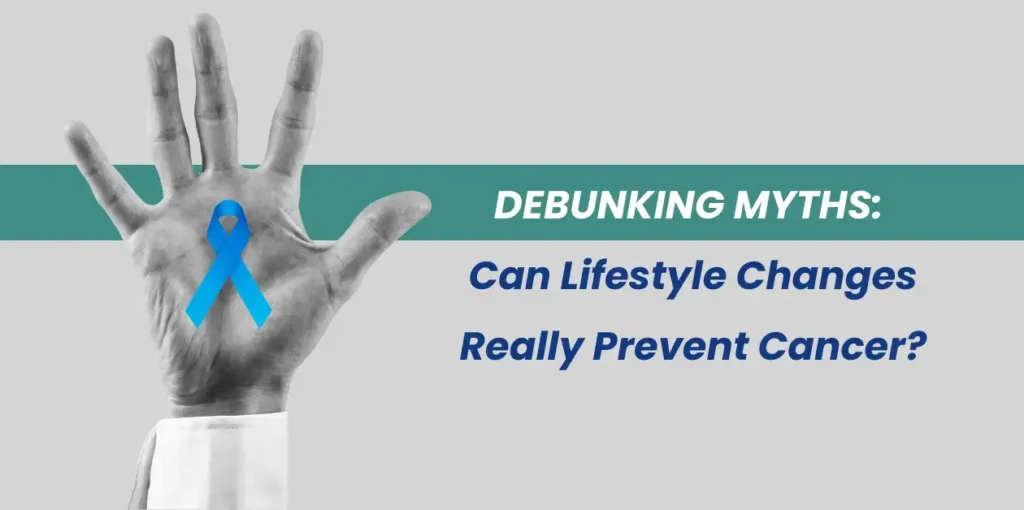Cancer myths debunked: Can Lifestyle Changes Really Prevent Cancer?

Cancer is a complex disease influenced by a variety of factors, including genetics, environment, and lifestyle. While no single lifestyle change can guarantee cancer prevention, adopting healthy habits can significantly reduce the risk. This blog aims to debunk common cancer myths and highlight the importance of diet, exercise, and early screenings in cancer prevention.
Myth 1: Cancer is purely genetic - Cancer myths debunked
Many people believe that cancer is solely determined by genetics. While genetics do play a role, lifestyle factors such as smoking, diet, and physical activity also significantly impact cancer risk. Studies show that up to 40% of cancers can be prevented through lifestyle changes. For example, smoking is a major risk factor for lung cancer, but quitting smoking can dramatically reduce this risk. Similarly, maintaining a healthy weight and staying physically active can lower the risk of several types of cancer, including breast and colorectal cancer.
Myth 2: Superfoods can prevent cancer
The idea that certain “superfoods” can prevent cancer is a popular myth. While foods like blueberries, kale, and turmeric have health benefits, no single food can prevent cancer. A balanced diet rich in fruits, vegetables, whole grains, and lean proteins is more effective in reducing cancer risk. Antioxidants found in many fruits and vegetables can help protect cells from damage, but they work best as part of a varied diet rather than in isolation. It’s also important to limit the intake of processed foods, red meat, and sugary drinks, which have been linked to an increased risk of cancer.
Myth 3: Only smokers get lung cancer
While smoking is the leading cause of lung cancer, non-smokers can also develop the disease. Factors such as secondhand smoke, radon exposure, and air pollution contribute to lung cancer risk. Regular screenings and avoiding exposure to these risk factors are crucial for prevention. For instance, radon is a naturally occurring radioactive gas that can accumulate in homes, and testing for radon levels can help mitigate this risk. Additionally, occupational exposures to certain chemicals and substances can increase lung cancer risk, highlighting the importance of workplace safety measures.
Importance of Diet and Exercise - Cancer myths debunked
A healthy diet and regular exercise are essential for cancer prevention. Diets high in processed foods, red meat, and sugary drinks are linked to increased cancer risk. Conversely, diets rich in plant-based foods, fiber, and healthy fats can lower the risk. Physical activity helps maintain a healthy weight, reduces inflammation, and boosts the immune system, all of which contribute to cancer prevention. The World Cancer Research Fund recommends at least 150 minutes of moderate-intensity exercise per week, such as brisk walking or cycling. Additionally, incorporating strength training exercises can help build muscle and improve overall health.
Early Screenings and Regular Check-ups
Early detection is vital for successful cancer treatment. Regular screenings for breast, cervical, colorectal, and prostate cancers can detect the disease at an early stage when it is most treatable. Consult with your healthcare provider to determine the appropriate screenings based on your age, gender, and family history. For example, mammograms are recommended for women starting at age 40, while colonoscopies are recommended for adults starting at age 50. Pap smears and HPV tests are essential for detecting cervical cancer, and PSA tests can help detect prostate cancer in men.
The Role of Vaccinations
Vaccinations also play a crucial role in cancer prevention. The human papillomavirus (HPV) vaccine can prevent cervical, anal, and other types of cancer caused by HPV. The hepatitis B vaccine can reduce the risk of liver cancer. Ensuring that you and your children are up-to-date on these vaccines can significantly lower the risk of developing certain cancers.
The Impact of Alcohol and Tobacco
Both alcohol and tobacco use are significant risk factors for cancer. Alcohol consumption is linked to an increased risk of cancers of the mouth, throat, esophagus, liver, breast, and colon. Limiting alcohol intake to moderate levels (up to one drink per day for women and up to two drinks per day for men) can help reduce this risk. Tobacco use, including smoking and smokeless tobacco, is a major cause of cancer and other serious health conditions. Quitting tobacco use can greatly reduce the risk of cancer and improve overall health.
The Importance of Sun Protection
Exposure to ultraviolet (UV) radiation from the sun and tanning beds is a major risk factor for skin cancer, including melanoma. Protecting your skin by wearing sunscreen with a high SPF, seeking shade, and wearing protective clothing can help reduce this risk. Regular skin checks and monitoring for any changes in moles or skin lesions are also important for early detection of skin cancer.
Conclusion
While no lifestyle change can guarantee cancer prevention, adopting healthy habits can significantly reduce the risk. By debunking common myths and focusing on evidence-based practices, we can take proactive steps towards a healthier future. Maintaining a balanced diet, staying physically active, avoiding tobacco and excessive alcohol, protecting your skin from UV radiation, and getting regular screenings and vaccinations are all important strategies for reducing cancer risk. By making informed choices and prioritizing our health, we can work towards a future with lower cancer incidence and better outcomes for those affected by the disease.

Dr. A. Venugopal
Clinical Director & HOD Medical Oncology Senior Consultant Medical Oncologist & Hemato-Oncologist
About Author
Dr. A. Venugopal
MD (General Medicine), DM (Medical Oncology), MRCP – SCE Medical Oncology (UK), ECMO (Switzerland).
Dr A. Venugopal is One of the best medical oncologist and Hemato Oncologist in hyderabad, currently serving as the Head of the Department and Senior Medical Oncologist, Hemato Oncologist at Pi Health Cancer Hospital in Gachibowli, Hyderabad. He brings over 15 years of extensive experience in the field of Oncology.
